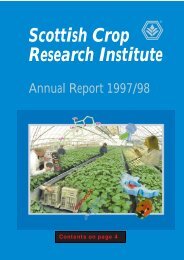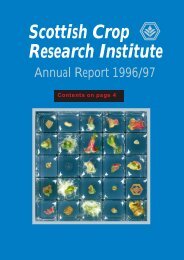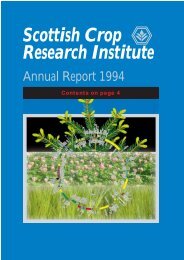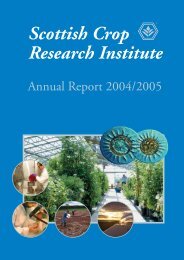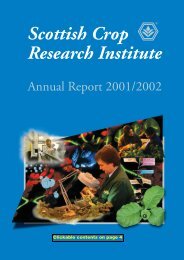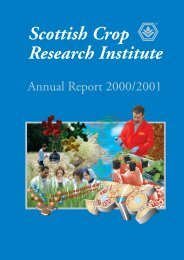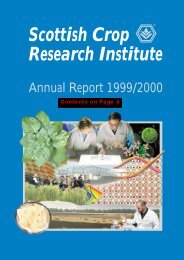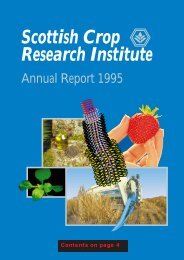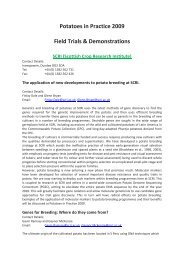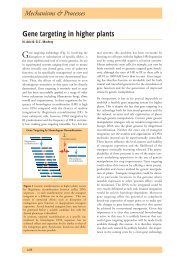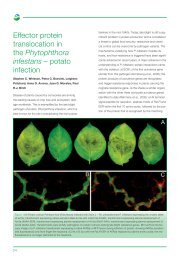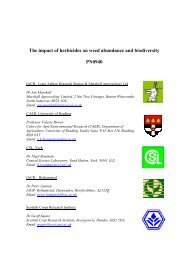PDF file: Annual Report 2002/2003 - Scottish Crop Research Institute
PDF file: Annual Report 2002/2003 - Scottish Crop Research Institute
PDF file: Annual Report 2002/2003 - Scottish Crop Research Institute
You also want an ePaper? Increase the reach of your titles
YUMPU automatically turns print PDFs into web optimized ePapers that Google loves.
GM herbicide-tolerant crops<br />
technicians, challenging their intellects and manipulative<br />
skills by major problems that are not narrow in<br />
discipline or technique.<br />
The outcome and launch of the results relieved the<br />
pressure from journalists and public. There has since<br />
been less of a tendency for enquirers to assume we are<br />
going to lie or obfuscate. The following quote from<br />
the New Scientist magazine is welcome: “The green<br />
groups claimed the experiment was biased and the<br />
researchers were in the pocket of the biotech industry.<br />
It wasn’t, and they weren’t.” However, such comment<br />
should not simply be accepted because it is commendatory.<br />
I suspect that fewer positive comments on<br />
the conduct and competence of the researchers would<br />
have been made if the GMHT cropping had shown<br />
strong positive effects on the arable food web, yet the<br />
conduct of the study would have been the same.<br />
Publicly funded science still has a task to convince<br />
people that it is not swayed by this or that global<br />
interest. Independence and security of funding are<br />
essential.<br />
Some conclusions and next steps Many commentators<br />
see the FSE as having ended with the launch of<br />
the results for the spring-sown crops. This is not so.<br />
The results for autumn-sown (winter) oilseed rape, by<br />
far the main break crop in the UK, are a year later<br />
than the spring-sown crops, and will be analysed and<br />
completed in 2004. Carry-over effects on plant populations,<br />
particularly of the buried seed, and decline<br />
rates of the GM and conventional seed residues will<br />
continue to be measured. Analysis is in progress on<br />
outcrossing from GMHT crops to surrounding populations<br />
and fields during <strong>2002</strong> and <strong>2003</strong>. The FSE<br />
group is working on the important matter of up-scaling<br />
the results to address ‘what if’ questions (e.g. what<br />
would be the effect on arable biodiversity as a whole if<br />
most break crops were GMHT?).<br />
The FSE has shown that major ecological questions<br />
are tractable; that well designed and well executed<br />
experiments can sift the background noise to leave<br />
quite small effects of treatment. Given this, it is feasible<br />
to define general and widespread features of a sustainable<br />
arable system and determine which<br />
biotechnology best fits the habitat. Moreover, all new<br />
technology should be considered before it is implemented<br />
– certainly not just GM technology - and we<br />
should be able to move forward with less confrontation<br />
and position-taking than has been the case<br />
around the FSE. This far, the ecological effects of<br />
cropping with GM herbicide-tolerant varieties appear<br />
small, but by no means negligible, compared to many<br />
other factors of intensification and global change<br />
affecting the habitat’s capacity to hold and recycle<br />
energy and nutrients. Was it worth it? Certainly, for<br />
the science, for the good colleagues, for the experience<br />
of the farms and farmers! Perhaps most rewarding for<br />
me is the knowledge that arable field systems are still<br />
potentially biologically rich and could be managed to<br />
balance yield and food web.<br />
Acknowledgements<br />
The FSE research group publicly thanked the civil servants,<br />
the companies, the Steering Committee, and<br />
the farmers for their essential contributions 25 . I personally<br />
thank my FSE colleagues at SCRI (particularly<br />
Dr Cathy Hawes), CEH and Rothamsted <strong>Research</strong>,<br />
and the Director of SCRI, Professor John Hillman,<br />
who from inception of the study in 1999 to the first<br />
publication in October <strong>2003</strong> gave undiminished trust<br />
and support (without pressing me to tell him the<br />
results in advance of the launch!).<br />
References<br />
1 Krebs J R, Wilson J D, Bradbury R B, Siriwardena G M. (1999).<br />
The second Silent Spring? Nature 400, 611-612.<br />
2 Robinson R A, Sutherland W J (<strong>2002</strong>). Post-war changes in arable<br />
farming and biodiversity in Great Britain. Journal of Applied Ecology<br />
39, 157-176.<br />
3 Bruce D, Bruce A (1998). Engineering Genesis. The ethics of<br />
genetic engineering in non-human species. London: Earthscan<br />
Publications.<br />
4 The Defra web site on the FSE www.defra.gov.uk/environment<br />
/gm/fse<br />
5 Firbank LG, et al. (<strong>2003</strong>). An introduction to the farm-scale evaluations<br />
of genetically modified herbicide-tolerant crops. Journal of<br />
Applied Ecology 40, 2-16.<br />
6 Squire G R, et al. (<strong>2003</strong>). On the rationale and interpretation of<br />
the Farm Scale Evaluations of genetically modified herbicide-tolerant<br />
crops. Philosophical Transactions of the Royal Society London, B<br />
358, 1779-1799.<br />
7 Squire G R, Gibson G J (1997). Scaling-up and scaling-down.<br />
Matching research with requirements in land management and policy.<br />
In Scaling up: from cell to landscape. Eds P R van Gardingen, G<br />
M Foody, P J Curran, pp. 17-34. Cambridge: Cambridge<br />
University Press.<br />
8 Perry J N, Rothery P, Clark S J, Heard M S, Hawes C (<strong>2003</strong>).<br />
Design, analysis and statistical power of the Farm-Scale Evaluations<br />
of genetically modified herbicide-tolerant crops. Journal of Applied<br />
Ecology 40, 17-31.<br />
9 Philosophical Transactions of the Royal Society, Biological<br />
Sciences. (<strong>2003</strong>) The Farm Scale Evaluations of spring-sown genetically<br />
modified crops. 358 (theme issue).<br />
10 Hawes C, et al. (<strong>2003</strong>). Responses of plants and invertebrate<br />
trophic groups to contrasting herbicide regimes in the Farm Scale<br />
Evaluations of genetically modified herbicide-tolerant crops.<br />
Philosophical Transactions of the Royal Society London, B 358, 1899-<br />
1913.<br />
11 Ramsay G, Thompson C, Squire G R (<strong>2003</strong>) Quantifying landscape-scale<br />
geneflow in oilseed rape. Final report of Defra project<br />
RG0216. London: Defra.<br />
88



